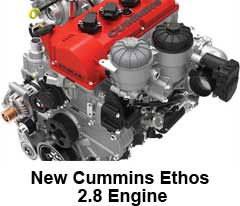Truck manufacturers may in the end make it easy for shippers to reduce their CO2 emissions, the latest example being a new engine and powertrain being developed by Cummins that may reduce CO2 output by as much as 80% in the delivery van sector.
This week, the company said that it has partnered with the California Energy Commission (CEC) to develop a new engine built to run on E-85 fuel, which is a blend of 85% ethanol and 15% gasoline.
Cummins calls the new medium-duty engine - in final testing mode - the Ethos 2.8 E85. Because E-85 burns cleaner than gasoline, Cummins says Ethos-powered vehicles should produce up to 80% fewer carbon dioxide emissions (CO2) than a similar gas-powered truck while offering comparable performance and total-cost-of-ownership benefits as diesel engines used in the 19,500 lb. step-van market.
At this point in the engine development cycle, Cummins said after two-and-half years of initial testing (which racked up 1,000 miles and 1,500 hours), the project has entered the final on-road validation testing phase. During its earlier testing, Cummins reported CO2 reductions well exceeded the 50% goal set at the outset of the program.
Besides running on E-85, the Ethos incorporates a number of other features designed to help improve fuel efficiency and reduce emissions, including an integrated stop-start system that shuts down the engine after the vehicle comes to a complete stop and the brake pedal remains depressed.
A robust starter, smart alternator and various sensors have been included to handle the additional stop-start duty cycle. The engine uses Valvoline NextGen oils which have been formulated for lower CO2 emissions
Work has also been done to marry the Allison Transmission 2000 Series to the stop-start system. The transmission uses hydraulic circulation to produce smooth shifts and quick vehicle launch during stop-start driving.
 The engine has been incorporated into a prototype Freightliner custom MT45 Class 5 step-van chassis. Cummins says that to take full advantage of the favorable combustion attributes and potential of E-85, the engine operates at diesel-like cylinder pressures and incorporates advanced spark-ignition technology The engine has been incorporated into a prototype Freightliner custom MT45 Class 5 step-van chassis. Cummins says that to take full advantage of the favorable combustion attributes and potential of E-85, the engine operates at diesel-like cylinder pressures and incorporates advanced spark-ignition technology
"The Cummins Ethos engine, developed through a research partnership with CEC, clearly demonstrates that by combining innovative engine design and combustion approaches with low-carbon alternative fuels, we can determine a path to significant reductions in greenhouse gas emissions," said Wayne Eckerle, Cummins vice-president of research and technology.
The Ethos engine is designed to run on cellulosic E-85, which is less intensive in terms of land use, tilling, fertilizing and harvesting than corn-derived E-85.
Cummins notes that "Although not in high-volume production today, cellulosic ethanol represents a promising production pathway for future fuels. This demonstrates that significant reductions in GHG emissions can be achieved with current commercially available E-85 fuels, with even greater potential in the future when cellulosic ethanol technology matures and becomes mainstream."
The Alternative Fuels Data Center web site says that in late April, the last date for which it has published data, E-85 was selling nationally at about $3.41 per gallon, versus $3.65 for gasoline and $3.95 for diesel.
One key question is whether this new engine technology could eventually scale up for heavy-duty, Class 8 trucks. No response yet to our question into Cummins on that question, but we will update you on this page as soon as we hear back.
What do you think of this new Cummins engine? Will the marketplace take care in the end of many CO2 issues? Let us know your thoughts at the Feedback button below.

TheGreenSupplyChain.com is now Twittering! Follow us at www.twitter.com/greenscm
|